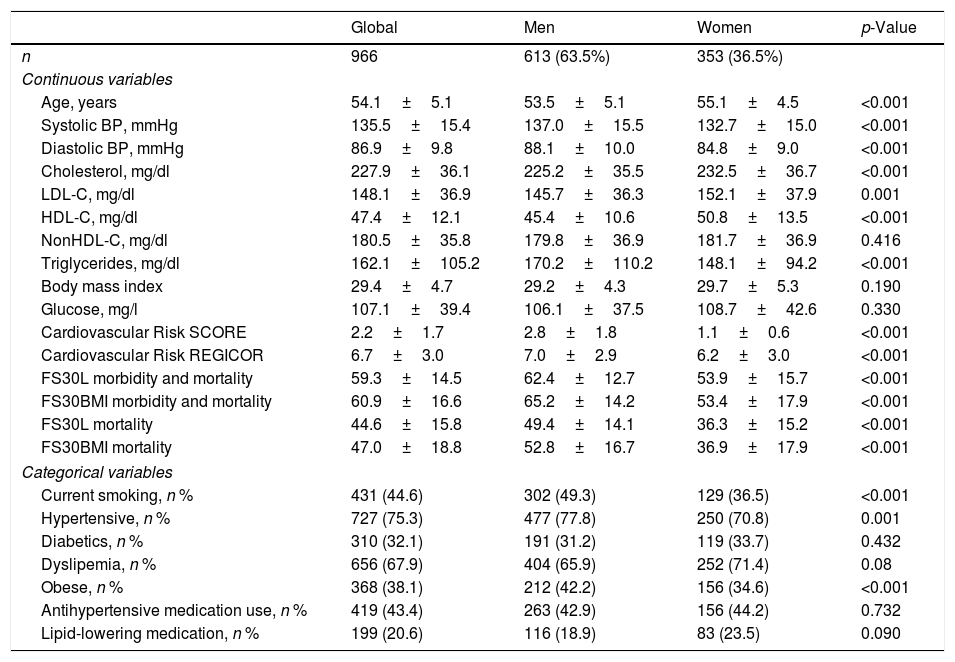The estimation of cardiovascular risk (CVR) with scores at 30 years old has a special interest in reclassifying in a suitable way <60 year subjects with intermediate CVR. This study analyzes what percentage of patients with intermediate CVR included in the MARK study is reclassified by applying the 30-year Framingham score (FS30). It also analyzes the degree of agreement between the two equations to classify high risk subjects.
Patients and methodsCross-sectional study of 966 subjects included in the MARK study. The CVR was calculated with the two versions of the FS30 (based on lipids and body mass index) for “hard” cardiovascular events in subjects with intermediate CVR.
ResultsThe 59% and 61% of the subjects with intermediate CVR would be classified as if they had high CVR to undergo a hard event if we used the FS30 in both versions. 70% of men and 35% of women would be classified as high CVR (p<0.01). The agreement percentage, measured with the Kappa index, between the equations FS30L and FS30BMI to classify the high-risk subjects was 67.9% (in men 67.4% and in women 68.7%).
ConclusionsIn subjects with intermediate CVR the FS30 reclassifies more than the half as high RCV, 2 out of 3 men and 1 out of 3 women.
La estimación del riesgo cardiovascular (RCV) con ecuaciones a 30 años tienen un interés especial para reclasificar de manera adecuada los sujetos de 60 años con RCV intermedio. Este estudio analiza qué porcentaje de pacientes con RCV intermedio incluido en el estudio MARK se reclasifica aplicando la puntuación de Framingham a 30 años (FS30) y grado de concordancia entre las 2 ecuaciones para clasificar a los sujetos de riesgo alto.
Pacientes y métodosEstudio transversal de 966 sujetos incluidos en el estudio MARK. El RCV se calculó con las 2 versiones del FS30 (basado en los lípidos y el índice de masa corporal) para eventos cardiovasculares «duros» en sujetos con RCV intermedio.
ResultadosEl 59 y el 61% de los sujetos con RCV intermedio se clasificarían como si tuvieran un RCV alto para sufrir un evento difícil si utilizáramos el FS30 en ambas versiones. El 70% de los varones y el 35% de las mujeres se clasificarían como RCV alto (p<0,01). El porcentaje de concordancia, medido con el índice Kappa, entre las ecuaciones FS30L y FS30BMI para clasificar a los sujetos de alto riesgo fue del 67,9% (en varones 67,4% y en mujeres 68,7%).
ConclusionesEn sujetos con RCV intermedio, el FS30 reclasifica más de la mitad como RCV alto, 2 de cada 3 varones y una de cada 3 mujeres.










